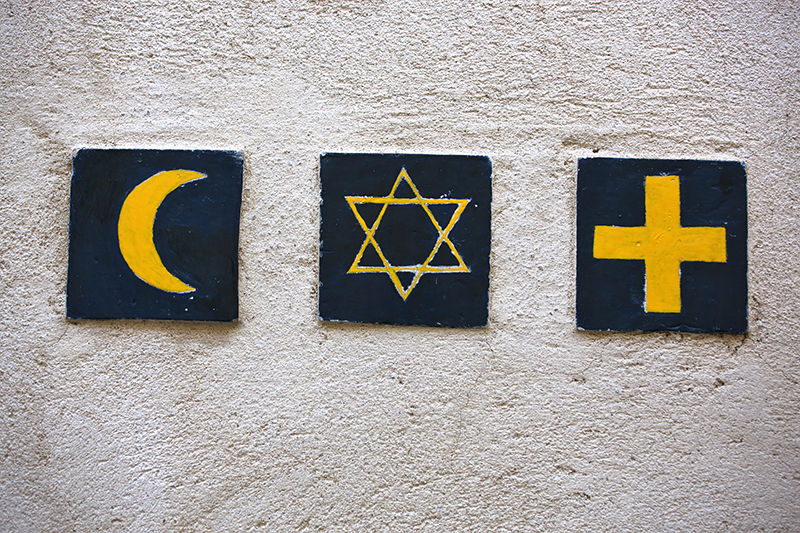Nearly 200 people attended the 40th annual Catholic-Jewish Women’s Conference — “Our Planet in Peril: Repairing the Earth Through the Lens of Faith” — at Valley Beth Shalom in Encino on Nov. 11. The keynote speakers —Sister Toni Nash, a sister of St. Joseph of Carondelet and co-founder of Sisters of Earth, and Rabbi Sarah Bassin, the associate rabbi of Temple Emmanuel, Beverly Hills — both encouraged those gathered for “two traditions in dialogue” to discuss the interconnectedness of faith and its role in supporting the environment.
The guests were greeted by Rosario Bayon, the Catholic co-chair for the event, Jewish co-chair Bobbi Rubinstein, Rabbi Ed Feinstein, the senior rabbi at Valley Beth Shalom, and Janna Weinstein Smith, director of AJC Los Angeles.
Sister Nash, who has a “deep concern for the ecological and spiritual crises of our times,” gave the audience a Catholic perspective on how Catholics are expected to care for the environment. She looked to Pope Francis’ encyclical, and encouraged listeners “to change their lifestyles because the earth is a sacrament of communion.”
“Not only can the earth not sustain the rate at which we are consuming it, but we are destroying a sacred gift,” said Sister Nash.
She expressed the idea of having an “attitude of gratitude” for the Earth, and that a “desire to share it with others” should be enough to motivate people to make changes.
“However, when we see ourselves as superior to the rest of creation, we can tend to think that we are entitled to use, and use up, its gifts,” said Sister Nash.
She also talked about the human attachment to comfort, immediate gratification and personal independence as being roadblocks to “finding the grace to live as grateful creatures of a generous Creator.”
“We have to be able to give up a few of the entitlements we like so much so that the whole community of creation may thrive and we can experience communion with both Creator and creation,” said Sister Nash.
Rabbi Sarah Bassin, who gave a Jewish perspective on how best to care for the environment, looked to the Hebrew Bible for guidance “by gleaning values from the text.”
Rabbi Bassin began with Genesis 1 and 2 to decipher what the environmental message is from the Jewish tradition.
“We all know the Bible offers two accounts of the creation of man. Adam (in Genesis 1) received the mandate from the Almighty to fill the earth and subdue it. Adam (in Genesis 2), was charged with the duty to cultivate the garden and to keep it,” said Rabbi Bassin.
The midrash, a Jewish term to resolve problems in the interpretation of difficult passages of text in the Hebrew Bible, says that “actually, there is no contradiction between Genesis 1 and 2.”
“If we don’t mess up our obligation of stewardship, then we get a privileged position in having dominion over the rest of the world. We get to be in charge. If we mess up … it’s the environment around us that controls us. That’s the environmentalist message built into the core of Jewish tradition right at the outset,” she said.
Rabbi Bassin went on to talk about the connection to land found in biblical text.
“There’s the respect that we are supposed to give to the field, recognizing that we can’t do whatever we please with it — that it has its own cycle of rest, just like we do,” said Rabbi Bassin.
She also urged, “Do not waste,” and noted that “consumption should be limited to what we need — no more.”
“It is our sacred duty as Jews to acknowledge our God-given responsibility and take action to alleviate environmental degradation and the pain and suffering it causes,” said Rabbi Sarah.
Together, the keynote speakers answered questions from the audience after their presentations.
Father Alexei Smith, Ecumenical and Interreligious Affairs Officer of the Archdiocese of Los Angeles, gave a blessing before lunchtime.
Following lunch, the women broke into small groups, each facilitated by two women, one Catholic and one Jewish, to further discuss how to make changes for the good of the environment, especially when examining one’s own faith. The women recognized the need for changes within themselves.
“The need to be conscious of the interconnectedness of everything in God’s creation and how what I personally do or not do has consequences on the rest of creation,” said Rosario Bayon.
The Catholic-Jewish Women’s Conference (CJWC) promotes understanding and good fellowship in the Greater Los Angeles area between women of both faith traditions, according to Doris Haims, CJWC steering committee member.
“Interfaith dialogue gives us the opportunity to learn more about each other’s religious background and what it means personally to each one of us. It creates a sense of ongoing community and enforces the concept that we need to work together to make our world a better place,” said Haims.
The conference ended with the Jewish Shabbat — a lighting of candles — to honor the coming of the Sabbath.

